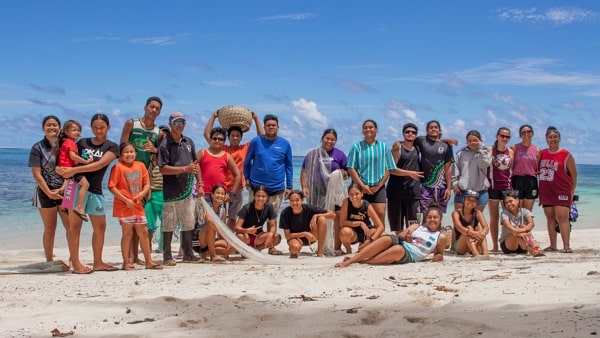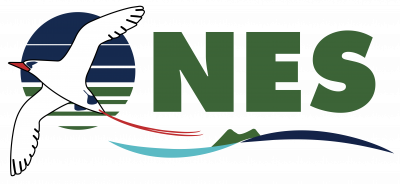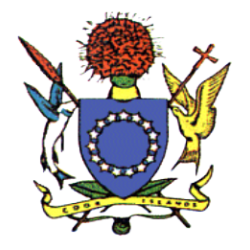
| Partners | Name | Role |
|---|---|---|
House of Ariki (HOA) | HOA is a Constitutional and Statutory Agency of the Cook Islands that comprises all principal Indigenous paramount Ariki (High Chiefs) from the nation’s 24 tribes. The strong traditional land tenure system enables HOA to exercise significant influence over land management and traditional conservation environmental management practices. Their support for landowner and community conservation areas is critical. | |
 | Ministry of Agriculture (MOA) | The function of MOA is to promote and encourage the development of all phases of agricultural, pastoral, and horticultural industries. MOA has extended its functions to include household and national food security and nutrition, research and development into crop and tree species, and improved agricultural production methods. This includes livestock and improving biosecurity to cope with emerging border protection challenges. www.agriculture.gov.ck |
 | Cook Islands Tourism (CIT) | CIT aims to advance the wellbeing of Cook Islanders by ensuring economic benefits to the Cook Islands while sustaining development towards a clean environment. While CIT promotes tourism internationally and in the Cook Islands, its primary environmental role is to ensure that tourism activities do not degrade the natural environment. www.cookislands.travel |
 | Infrastructure Cook Islands (ICI) | ICI is responsible for the majority of the Cook Islands Government’s capital infrastructure projects with some regulatory responsibilities. ICI works with donor partners, Island Governments, Government agencies, private sector and the community. Their intent is to carry out operations and maintenance of public infrastructure assets in Rarotonga and the Pa Enua. www.ici.gov.ck |
 | Natural Heritage Trust (NHT) | NHT is a partner agency to NES and other Government agencies on biodiversity related matters. The NHT collects and integrates scientific and traditional information on Cook Islands flora and fauna. NHS owns and manages the Cook Islands Biodiversity database. www.cinature.org |
 | MMR | The Ministry of Marine Resources is responsible for the sustainable resource management and economic development of the marine sector in the Cook Islands. MMR partners with NES in multiple projects from inshore, offshore, survey and data collection projects. These projects assist the decision making for the Cook Islands Government, Island Government, Aronga Mana and the community. www.mmr.gov.ck |
 | Te Ipukarea Society (TIS) | TIS is an Environmental NGO focused on biodiversity, waste management, climate change, youth and eco sustainable development. TIS has many successful initiatives that include the recovery program for the endangered Rarotonga Monarch; "Save Our Suwarrow" campaign. www.tiscookislands.org |
 | Kōrero o te 'Ōrau (KOTO) | KOTO is an Environmental NGO focused on improving the well-being of indigenous Cook Islanders and their environment. KOTO focal areas are on research, youth involvement, traditional knowledge, science based education and public awareness. www.korerooteorau.org |
International Partners
| Partners | Name | Role |
|---|---|---|
 | Global Environment Facility (GEF) | The Global Environment Facility enables Developing countries to invest in their environment. They provide funds to to adapt and meet international environmental convention objectives. Their key thematic areas are Biodiversity, Land degradation, Chemical and Waste, Climate Change and International Waters. www.thegef.org |
 | United Nations Development Programme (UNDP) | The UNDP is an international organization with a strong global presence. Its mandate is focused on sustainable development and governance. UNDP support the coordinated delivery of financing project assurance, oversee project implementation and provide support services, e.g., procure international consultants. www.undp.org |
 | UNEP – (Montreal Protocol) | The United Nations Environment Programme (UNEP) is the global authority that sets the environmental agenda. They aim to foster partnerships to inspire, inform and enable nations to achieve sustainable living. UNEP and NES have partnered on the Montreal Protocol on Substances that Deplete the Ozone Layer. |
 | Biodiversity Research Institute (BRI) | The Biodiversity Research Institute aims to evaluate new threats to ecosystems and wildlife. They conduct collaborative research to bring environmental issues to the forefront of decision-making. BRI has been instrumental in technical support to NES around chemical waste such as mercury. www.briwildlife.org |
 | The International Union for Conservation of Nature (IUCN) | The IUCN is the global authority on natural world status. Their focus is on nature conservation and promoting a global shift to sustainable development in a collective effort to conserve nature. IUCN is influential in protecting our endangered species here in the Cook Islands. www.iucn.org |
 | NZDOC | The New Zealand Department of Conservation is the government agency mandated to conserve the natural and cultural heritage of New Zealand. DoC run programs that protect and restore nature for people to enjoy today and in the future. DoC has been instrumental in conducting surveys, training of local experts and data collection in the Cook Islands that have helped shape our policies and legislation. www.doc.govt.nz |
 | SPREP | The Secretariat of the Pacific Regional Environment Programme is a Pacific regional organisation based in Samoa charged with protecting the Pacific environment and natural resources. They are mandated to foster relationships in the Pacific that improves the sustainable development of the region. NES is one of 21 member countries to the SPREP. www.sprep.org |
 | The Secretariat of the Pacific Community (SPC) | SPC is the Regional organisation that supports in science and technical capacity. They aim to align our National development Goals with those of the SDG while serving as a central hub for the Pacific community. www.spc.int |



